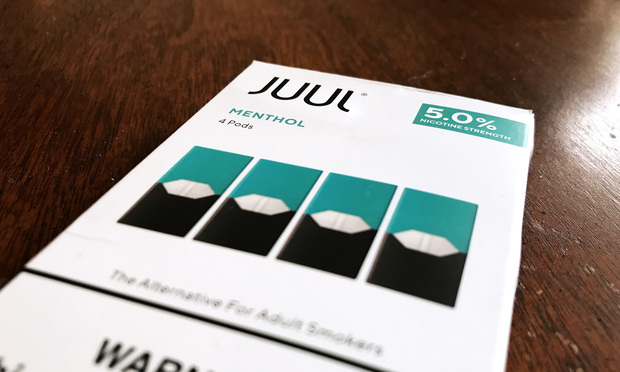Juul Labs and Altria Illegally Monopolized the E-Cigarette Market, Lawsuits Say
More than half a dozen class actions allege that Altria, as part of its 2018 agreement to acquire 35% of Juul, agreed to drop out of the closed system e-cigarette market in violation of federal antitrust laws. The lawsuits follow a similar administrative complaint brought by the Federal Trade Commission's filing April 1.
April 22, 2020 at 04:44 PM
4 minute read
 Juul menthol pods.
Juul menthol pods.
Class actions filed this month accuse Juul Labs Inc. and Altria Group Inc. of illegally monopolizing the market for electronic cigarettes in violation of federal antitrust laws.
More than half a dozen lawsuits allege that Altria, as part of its 2018 agreement to acquire 35% of Juul, dropped out of the closed system e-cigarette market. The class actions, filed in the U.S. District Court for the Northern District of California on behalf of a nationwide class of Juul purchasers, come after the Federal Trade Commission on April 1 filed an administrative complaint against both companies for violating federal antitrust laws through two agreements in 2018 and an amended agreement in 2020.
"We view those as three distinct violations that operate to allocate the market between Juul and Altria, and we would regard those as per se violations of Sherman Act that don't require any extensive market analysis," said Hausfeld's Michael Lehmann, in San Francisco, who brought a lawsuit Tuesday.
Residents in New Jersey, New York, Pennsylvania and California, filed the lawsuits behalf of a class of consumers who bought Juul e-cigarettes since either October or December 2018.
Plaintiffs attorney Todd Seaver of Berman Tabacco in San Francisco, who brought a case April 13, declined to comment. Joseph Saveri of San Francisco's Joseph Saveri Law Firm, who filed cases April 14 and April 20, did not respond to a request for comment. Barrett Beasley of Salim Beasley in Natchitoches, Louisiana, who filed a case with Motley Rice on April 7, and Terry Gross of San Francisco's Gross & Belsky, who filed a case Tuesday with Bernstein Liebhard, did not respond to requests for comment.
"We believe this lawsuit is flawed as a matter of fact and law and plan to defend ourselves vigorously," Altria spokesman Steven Callahan wrote in an email.
Juul attorney Gregory Stone, of Los Angeles-based Munger, Tolles & Olson, did not respond to a request for comment.
 The antitrust claims add another legal headache to Juul, which faces 440 lawsuits in multidistrict litigation before U.S. District Judge William Orrick of the Northern District of California. Those lawsuits focus on Juul's marketing claims to a class of customers, particularly to youth, and alleged personal injuries such as addiction, seizures and lung problems.
The antitrust claims add another legal headache to Juul, which faces 440 lawsuits in multidistrict litigation before U.S. District Judge William Orrick of the Northern District of California. Those lawsuits focus on Juul's marketing claims to a class of customers, particularly to youth, and alleged personal injuries such as addiction, seizures and lung problems.
On April 6, lead plaintiffs attorneys in the multidistrict litigation amended their consolidated complaints in the case, adding antitrust allegations to the class action against both Juul and Altria. They also sought to include the new antitrust lawsuits into the multidistrict litigation—a move that both Juul and several of the lawyers who brought this month's class actions have opposed.
"We think the antitrust claims are distinct from the consumer fraud claims that are the subject of the MDL and deserve a separate track of their own, and separate leadership," Lehmann said.
The new lawsuits focus on two agreements in 2018 between Juul and Altria: one in October in which Altria agreed to drop out of the market, and another in December in which Altria bought 35% share of Juul for $12.8 billion. The agreements included a noncompete provision, support services and licensing.
The two companies at first competed in the e-cigarette market, with Altria introducing the MarkTen in 2013. But, by 2018, Juul had 75% of the market, the suits say. Their agreements allowed Altria to appoint an "observer" to its board of directors.
In January, the suits say, the companies amended the agreement to allow Altria to appoint two of the five members of a new Litigation Oversight Committee and one of three members of a litigation subcommittee, which, by unanimous vote, could change Juul's outside counsel.
This content has been archived. It is available through our partners, LexisNexis® and Bloomberg Law.
To view this content, please continue to their sites.
Not a Lexis Subscriber?
Subscribe Now
Not a Bloomberg Law Subscriber?
Subscribe Now
NOT FOR REPRINT
© 2025 ALM Global, LLC, All Rights Reserved. Request academic re-use from www.copyright.com. All other uses, submit a request to [email protected]. For more information visit Asset & Logo Licensing.
You Might Like
View All
Apple Disputes 'Efforts to Manufacture' Imaging Sensor Claims Against iPhone 15 Technology

Lawsuit alleges racial and gender discrimination led to an Air Force contractor's death at California airfield
7 minute read
US Courts Announce Closures in Observance of Jimmy Carter National Mourning Day
2 minute read
'Appropriate Relief'?: Google Offers Remedy Concessions in DOJ Antitrust Fight
4 minute readLaw Firms Mentioned
Trending Stories
- 111th Circuit Rejects Trump's Emergency Request as DOJ Prepares to Release Special Counsel's Final Report
- 2Supreme Court Takes Up Challenge to ACA Task Force
- 3'Tragedy of Unspeakable Proportions:' Could Edison, DWP, Face Lawsuits Over LA Wildfires?
- 4Meta Pulls Plug on DEI Programs
- 5On the Move and After Hours: Meyner and Landis; Cooper Levenson; Ogletree Deakins; Saiber
Who Got The Work
Michael G. Bongiorno, Andrew Scott Dulberg and Elizabeth E. Driscoll from Wilmer Cutler Pickering Hale and Dorr have stepped in to represent Symbotic Inc., an A.I.-enabled technology platform that focuses on increasing supply chain efficiency, and other defendants in a pending shareholder derivative lawsuit. The case, filed Oct. 2 in Massachusetts District Court by the Brown Law Firm on behalf of Stephen Austen, accuses certain officers and directors of misleading investors in regard to Symbotic's potential for margin growth by failing to disclose that the company was not equipped to timely deploy its systems or manage expenses through project delays. The case, assigned to U.S. District Judge Nathaniel M. Gorton, is 1:24-cv-12522, Austen v. Cohen et al.
Who Got The Work
Edmund Polubinski and Marie Killmond of Davis Polk & Wardwell have entered appearances for data platform software development company MongoDB and other defendants in a pending shareholder derivative lawsuit. The action, filed Oct. 7 in New York Southern District Court by the Brown Law Firm, accuses the company's directors and/or officers of falsely expressing confidence in the company’s restructuring of its sales incentive plan and downplaying the severity of decreases in its upfront commitments. The case is 1:24-cv-07594, Roy v. Ittycheria et al.
Who Got The Work
Amy O. Bruchs and Kurt F. Ellison of Michael Best & Friedrich have entered appearances for Epic Systems Corp. in a pending employment discrimination lawsuit. The suit was filed Sept. 7 in Wisconsin Western District Court by Levine Eisberner LLC and Siri & Glimstad on behalf of a project manager who claims that he was wrongfully terminated after applying for a religious exemption to the defendant's COVID-19 vaccine mandate. The case, assigned to U.S. Magistrate Judge Anita Marie Boor, is 3:24-cv-00630, Secker, Nathan v. Epic Systems Corporation.
Who Got The Work
David X. Sullivan, Thomas J. Finn and Gregory A. Hall from McCarter & English have entered appearances for Sunrun Installation Services in a pending civil rights lawsuit. The complaint was filed Sept. 4 in Connecticut District Court by attorney Robert M. Berke on behalf of former employee George Edward Steins, who was arrested and charged with employing an unregistered home improvement salesperson. The complaint alleges that had Sunrun informed the Connecticut Department of Consumer Protection that the plaintiff's employment had ended in 2017 and that he no longer held Sunrun's home improvement contractor license, he would not have been hit with charges, which were dismissed in May 2024. The case, assigned to U.S. District Judge Jeffrey A. Meyer, is 3:24-cv-01423, Steins v. Sunrun, Inc. et al.
Who Got The Work
Greenberg Traurig shareholder Joshua L. Raskin has entered an appearance for boohoo.com UK Ltd. in a pending patent infringement lawsuit. The suit, filed Sept. 3 in Texas Eastern District Court by Rozier Hardt McDonough on behalf of Alto Dynamics, asserts five patents related to an online shopping platform. The case, assigned to U.S. District Judge Rodney Gilstrap, is 2:24-cv-00719, Alto Dynamics, LLC v. boohoo.com UK Limited.
Featured Firms
Law Offices of Gary Martin Hays & Associates, P.C.
(470) 294-1674
Law Offices of Mark E. Salomone
(857) 444-6468
Smith & Hassler
(713) 739-1250






